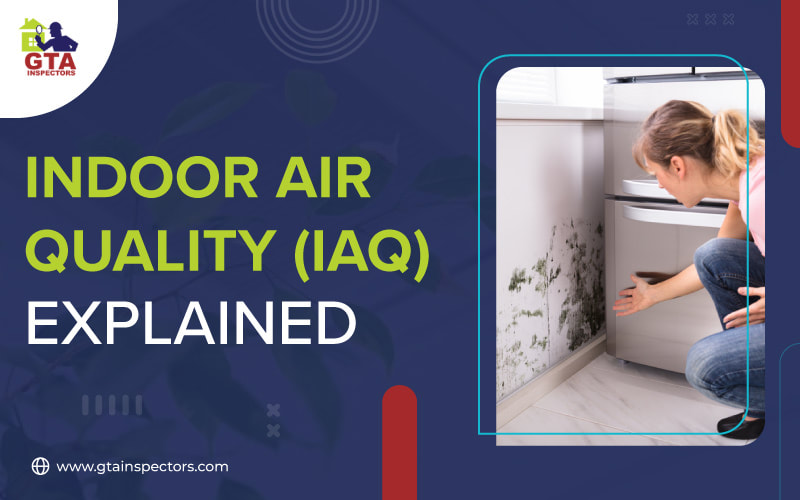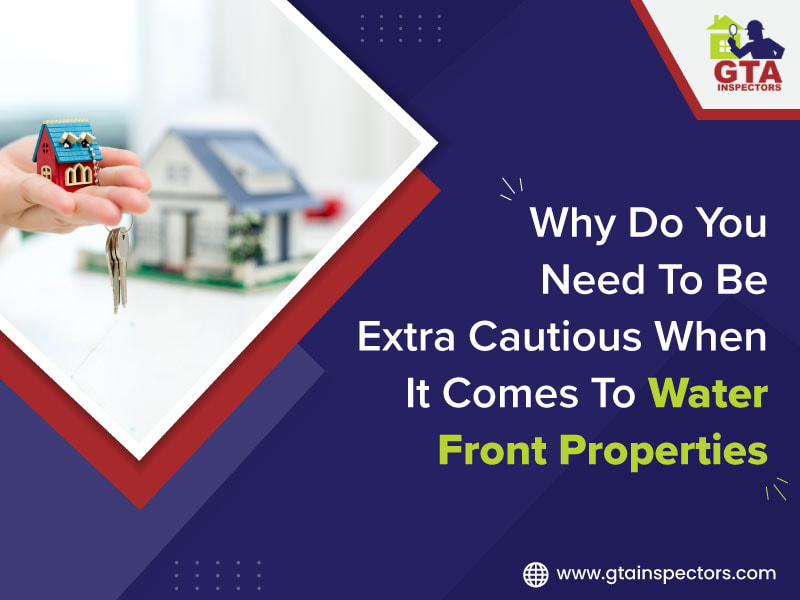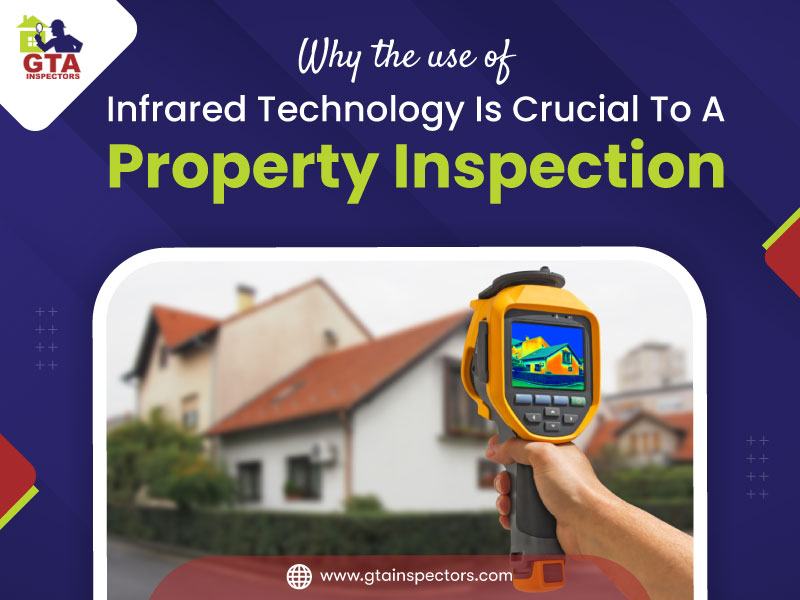|
Hovering over the (IAQ) Indoor Air Quality during a property inspection refers to examining the air quality inside the property and its premises. A check on the IAQ is crucial as it helps identify the presence of harmful environmental defects such as: mould, bacteria, etc and alerts you over serious health hazards like- headaches, dizziness, nausea, and many more! If you want to know more Indoor Air Quality and the concerns associated with it, check out our blog on the Impact of Indoor Air Quality!
0 Comments
A well-decorated modern home may not be as sound as it seems. A lack of fresh air and proper ventilation is a common problem found by home inspectors in present-day homes. For new and aware homebuyers, having a property inspection with the check on the (IAQ) Indoor Air Quality is a critical aspect of the examination. Poor Air Quality is said to have health implications such as fatigue, headaches, dizziness, and irritation to the eyes, nose and throat. And if it is even worse than poor, residents might face long-term dangers like cancer, respiratory diseases or heart-related issues. In this blog, we will highlight as much as we can to bring you the causes of the poor indoor air quality of the house and the necessary steps to curb the problem. Without further ado, let us look into the factors that can lead to a home's poor indoor air quality. An IAQ or Indoor Air Quality refers to the air quality inside and around the property's premises. Undergoing the property inspection process, there are high possibilities that the inspectors might come across things like pests, moisture, mould, radon and many such things that can affect the air quality of the property. Here are a few common causes of poor indoor air quality- 1. Poor Ventilation Provision: People have indulged themselves in small and comprehensive living with modern construction designs and techniques. Houses that are well-insulated and energy-efficient are the talk of the hour. But as we all know, every coin has two sides; this construction style, too, has a con of less air circulation. Therefore, when any disturbing element gets into the house, it's difficult to escape it or get diluted by ventilation. 2. Damage by Humidity: Moisture in the walls and surfaces of the property can give an invitation to poor quality of air. Therefore properties constructed in humid climates are more likely to be prone to inferior air quality of the house. Homeowners of such properties must be extra cautious over the growth of moulds and mildew in places like basements, bathrooms, kitchen sinks, water heaters and pools. 3. Presence of radioactive gases: The air quality of a house may get severely affected by the presence of radioactive gases like radon. Radioactive gases are emitted from decomposed uranium rocks. These gases are primarily colourless, odourless and tasteless and find their way into the atmosphere of a place through gaps and escape holes. It might be harmless in small traces, but these radioactive gases can take the residents into serious health hazards when mainly exposed to a place. 4. Biological pollutants: Biological contaminants like dust mites, pollen, bacteria, viruses, mould, mildew, droppings from rodents, cockroaches, and many other microorganisms are small enough to be invisible to the naked eye. These contaminants often lead to serious allergies and illness. 5. VOCs: During property snagging, another primary concern of the poor air quality is the presence of (VOC)Volatile Organic Compounds like wall paints, cleaning products, air fresheners, hair spray, crafting supplies and many other common fabrics. Generally, VOCs are emitted via the chemical smell of new or fresh products, for example- new rugs, curtains, or wall paints, and can result in health symptoms like– headache, dizziness, and nausea. Now that we have come across the various causes that can lead to poor indoor air quality, let's dive into the ways these uninvited situations can be identified and detected through a professional property inspection. 1. Radioactive gases testing: Property Inspectors can conduct air testing like the radon test using an active or passive air testing device and detect traces of radioactive gases like radon. The testing requires the collection of air samples which are sent to labs for analysis. 2. Carbon monoxide testing: Property inspectors often carry a portable CO detector to help get an overview of carbon monoxide's presence in the air. Apart from the portable detector, professionals commonly use thermal imaging during their property inspection process. 3. Bio contaminants testing: The use of an XRF machine for lead detection on the surface is another tool used during a property inspection. In a nutshell, we at GTA Inspectors advise you to go for a proper Indoor Air Quality Examination while getting sorted with the property's structure. The core reason behind this suggestion is the direct impact the air quality of a property possesses on its occupants. Ensure the good health of you and your loved ones by maintaining pleasant air quality within your nest! Are you looking for a quick hack to make your property sell faster? Then get a pre-listing home inspection done to stay ahead of your competition.
A pre-listing home inspection is a property inspection done before putting the property for sale. The sellers interested in keeping the property up to date get the pre-listing inspection done. These inspections are the same as any other home inspection, with the inspector taking a complete walk through the property ensuring all the components are working correctly and finding out the major problems if any. Being a seller, you must get ahead with your repairs to make your house more appealing to your clients. By investing in a pre-listing home inspection, you can easily spot the weaknesses in your property before losing a potential buyer because of ignored issues. Before putting your home on the market, a home inspection may seem irrelevant to many, but here are some reasons why home inspections are essential to get before pre-listing your property. To comprehend the condition of your property: Being a homeowner, you must be aware of the state of your property. There are many issues in the property that are not visible to our eyes. The condition of your home can only be predicted after a detailed inspection. However, home buyers can get home inspections done, and during that time, there are many repairs and issues spotted that you might have missed. Nobody wants to buy a property that is not well maintained and requires more investment. So it's suggested that a seller get a home inspection done and be aware of the condition of their property. Getting the repairs done in advance: A professional home inspection can allow you to fix all the defects in your property. It is mostly in the sellers' hands whether they want to fix the issues or leave them as is. If the seller decides to get the repairs done, it will help them save some money. If the buyer's inspector spots the issues, you must pay and negotiate according to the hired contractor. There is a possibility of wasting more money on the repairs than required. Sellers are suggested to get the repairs done by themselves for the freedom of selecting a budget-friendly contractor. The buyer may accept the existing inspection result: If your home has passed the pre-listing property inspection, there are chances that the client won't ask for any other future inspection. Pre-listing home inspections help you save money and time. We all understand that buying and selling a property is a long journey, so adding this step to this process can help you sell your property more quickly. Even if the buyers choose to go forward with their property inspection, they can compare the reports. And this will allow the buyer to trust your property. Opportunity to compare the reports: A pre-listing home inspection allows you to compare your property reports with the buyers. You can confirm if the buyer's report is dishonest or shows more repairs than the existing one. Comparing can help you save some money if irrelevant repairs are added to the report. A pre-listing home inspection always works for the benefit of the seller. The seller can be more confident about their property in front of the buyer. There will be buyers who will choose to get a separate home inspection. But it's best to spend money to build a rapport with the customer. If you are interested in getting a pre-listing property inspection, connect with our top-class inspection services at GTA Inspectors. Our Company has certified inspectors who have gone through a training program to give you best-in-class service. Every residential buyer needs assistance with planning out negotiations for their new property investment. You require a home inspection to understand and analyze your new property better. Waiving of home inspection can lead you to extensive future repairs and additional investment in your property than expected.
So after receiving your home inspection report, the first thing you need to do is analyze the report thoroughly. List down all the critical defects noted in your property snagging report. Now that you have your list, start preparing for your property negotiations. Here are some quality tips for negotiations after home inspections: Reviewing the inspection report with your agent - As you are new to home buying, if yes, then your real estate agent can help you list down the key points for negotiations from the inspection report. Some well-experienced agents will give you recommendations for repairs and concessions. Every agent understands the property they are selling you and can help you better plan your negotiations. List down repairs according to the cost and severity: Every home inspection reveals both severe and minor issues in your home. While planning your negotiation list, you need to prioritize the problems by considering the cost and severity of any issues encountered. Making two lists can be a great way to manage the repairs. First, make a list for negotiation with the seller, and then make the second list of repairs you can take care of later by yourself. Let the minor issues slide out: Minor issues like small wall cracks and chipped paints, and the buyer himself can resolve others. Sellers mostly refuse to acknowledge minor problems during negotiations. But if any significant problems are spotted, like structural issues or safety concerns, ensure to highlight them during negotiations. Get the quotations from contractors: Once you have the list of repairs for negotiation, you need to fix the cost of the repairs. Home inspectors cannot help you with planning estimates. Get an experienced contractor's help to get the exact repair cost. After discussing the quotations for your repairs with your contractor, please share them with the sellers. Be Reasonable: If your requests are reasonable and relevant, the seller will accept to pay for the repairs. It is important to consider the seller's situation while planning the negotiations. If your demands are superficial, the seller will refuse to pay. Ask your property snagging inspector for advice when it comes to presenting your negotiations. Place requests for concessions only for major items: There are serious concerns like structural problems, foundational defects, severe roof damage, malfunctioning HVAC systems, or molds. Ask your seller to get the renovations done and the condition fixed before closing the deal. The other methods of closing the deals are direct cash or reducing your selling price. Know when to walk away from the deal: After discussing the negotiation agreement with the seller, if you do not conclude, there are times when the seller won't agree with your negotiation request. You can go ahead if you are still willing to close the deal. But it's suggested that you choose another choice than buying a lemon house. As negotiations are accomplished after the home inspection report is received Making reasonable requests can help you close the deals. If the seller is still not agreeing, you can back out of the agreement. With professional home inspection services, you can smartly plan your negotiations. As a buyer, attend your home inspection so that you can note down the property defects yourself and get reasonable negotiations. With GTA inspectors get an accurate snagging report of the property you plan to invest in. Understanding The Relationship Between You, Your Real Estate Agent & Your Property Inspector.12/16/2022 A property purchase is a complex process, and many minds and the workforce are involved throughout the journey. So, if you are planning a property purchase soon, get ready for the grinding!
We know buying a house and getting a snagging inspection isn't very comforting. From brokers to real estate agents and home inspectors, diverse people are involved in the deal-making process. The coordination and relationship between the people involved could sometimes be more apparent. Here in this blog, we'll try to understand each person's role and how they are related to each other. First things first, everything starts with a need. Buying a property at the most basic level is a thought and needs to drive that thought. When this notion of yours takes the shape of a decision, the first person who would think of it is a broker or a real estate agent who can help suggest properties that suit your requirements. From presenting properties to ultimately finalising the deal, a real estate agent is responsible for coordinating and managing the entire home purchasing process. They advise and find properties for you to look at, inform the property details, connect you with the owners and facilitate the closing process. Apart from the deal-making, a real estate agent will also assist you with when to schedule your home inspection. He may suggest a few referrals of the best property snagging company around you. Now that you have moved ahead in the process and have shortlisted a few options that match your requirements. You are in the next phase of it, where steps in the property snagging company. This is the stage wherein a buyer would like to ensure that the property he is heading ahead for is in a healthy condition with all the major property systems running in a good state. A home inspector is responsible for checking and analysing the property and highlighting the spots that need repairs and construction. As a part of their work, they will conduct the inspection, form a documented report giving the details of everything they have analysed during the process and convey the findings to you and your real estate agent. The role of a property inspection company is restricted to only giving you a detailed report of the findings during the inspection process. They will not offer any opinion or influence about whether to make a deal. A property inspection aims to help the buyer make a more informed decision. The information laid in the report is conveyed to the buyer and the agent without a filter. Further, on which, any negotiation & help make the best deal. Now that everything has been laid out in time and has taken place in the right order, it is solely YOU who need to analyse everything that has taken place and make a decision. Based on the property inspection report and advice of technical experts, real estate agents and other professionals, you can either make a deal or withdraw from it. Everyone wishes to have the perfect dream place for themselves. However, you must always remember that no property is perfect and has to undergo certain wear and tear to suit your requirements significantly. Every stage of the property purchase process and the people associated with it are crucial for reaching the right conclusion. Where you and your real estate agent can be metaphorically referred to as the engine of a vehicle, property snagging company and inspection officers can be referred to as the fuel to the engine. Without them, you can reach conclusions, but there's always a possibility of ending up in a deal that is not fair. Decide for yourself! Do you also need a property inspection for your dream house or not? Connect with GTA Inspectors if you are stuck in the dilemma of signing the property deal! .Once your home is listed and the purchaser is ready to buy it, the next step is to prepare your property for inspection. The sale of your property might get canceled because of poor results during the inspection.
The inspection step comes after the buyer has signed the purchase agreement. The buyer opts for a home inspection to find the property's major and minor issues and bargain accordingly. As a seller, it's your responsibility to make sure there are no repairs left on the parcel before the inspection. With the factors mentioned below, you can prepare your home for a property inspection: Making the areas accessible for checking: Keeping the common checked areas easily accessible to the property snagging inspector is vital. Clear the clutters away so that the inspector can be carried smoothly. If any places in the property become challenging to check can become a red flag in the eyes of the buyer. The areas like under sinks, furnace rooms, and basements should be accessible. Check the outside of the house: A property inspection officer will check your property's inner and outer functioning. To prepare your home for inspection, make sure you have cleared the external surrounding properly. There is no water logging, extra plant growth on walls, or trash areas, so your house looks clean inside and out. Checking the Condition of your Roof: When was the last time you checked your roof leakage areas and the roof's condition? The roof is an essential part of your home, so always pay attention to this part. Get a ladder and clean all the moss, debris, and gutters. Checking the leakages and missing tiles can help you during the home inspection. Take care of the damages found on priority before the property inspection day arrives. Keep your property clean: Property hygiene is the most fundamental factor to remember when listing your home for sale. You must have already kept your property neat and clean, so buyers are attracted to your home. Maintain the hygiene of your home even after the purchaser accepts the house. The property's hygiene doesn't play any essential role in home inspection, yet keeping it clean shows how responsible you are towards maintenance. Check the electrical appliances : If you are selling and furnishing a house, check everything works properly. Get the minor issues repaired. Check on the switches and bulbs in the house and change them with new ones if required. Getting the appliances checked can save you from failing your home inspection reports. Always try to avoid scenarios that can cause future problems. Check the functioning of the toilet area: There are various problems spotted in the toilet areas, like leakage, water drainage issues, flush knob issues, and many more. Make sure everything is perfect in your bathrooms. If minor repairs are required, get them done as soon as possible. Now, you know what areas you need to check before the home inspection. Remember that buyers don't expect any perfection, but ensuring that your house is up-to-date can help you win quality buyers. Also, good snagging reports can help you build trust with the customers. The dilemma of purchasing a new property! It is a common observation seen in the eyes of first-time property buyers. Some numerous preferences and doubts are deeply grounded in the hearts and minds of property buyers. And to address the same, the real estate market offers service providers like brokers and agents who help buyers shortlist and finalise what they are looking for.
But what about the condition of the property? Can real estate agents guide you well? Are they qualified enough to assist you with accurate results? The answer to these doubtful questions is a big NO. Real estate agents can give a general overview depending on what they see. Still, you want to be fed with clarity and accurate information. In that case, you can get in touch with a certified property snagging company enriched with experienced and qualified professionals well-versed in property analysis. A property snagging organisation, with the help of its experienced and professional property inspectors, perform a thorough inspection of the property and its surroundings and pen down the observations, healthy areas and problematic spots of the property in the form of a property inspection report. The first-timers, people generally go in for a 4-point inspection. But what is a 4-point review? Let's further explore understanding a 4-point property inspection and how it differs from a full house inspection. A 4-point property inspection refers to the examination of the property which revolves around four major systems i.e.
To sum up, whether a four-point inspection or a comprehensive home inspection depends entirely on the choice and preference of the homeowner. Depending upon the life of the property, if it is a newly constructed property, the owner must go for the complete property inspection, but if you are thinking of moving into a property that is well-aged must go for a four-point inspection. Still, having a bubble of doubt? We are here to burst the bubble and take you through true evaluations. Connect with GTA Inspectors- a leading property snagging company in Dubai to break all the myths and get genuine advice on the property's condition and eventually make a more informed decision. How beautiful could it be to wake up to a view of shimmery water and the sun shining bright? Waterfront properties, whether beach, lake or river, have soothing ideas and never-ending recreation opportunities. Many home buyers or people in business who believe in retreats and an everyday-vacay state of mind go for buying property along the waterfront.
But, to talk in reality, no matter how appealing and dreamy a water-facing property may seem, it isn't comfortable for everyone. Therefore, before investing that extra cash in your dreamy house, it is advised to keep all your basics clear. And what better than having a property snagging company to help you understand what all goes into having a perfect waterfront property? A water-facing property can be among the most appealing types of property in real estate. But, it is often accompanied by complexities that are usually absent with other properties. In this blog, we will highlight how a waterfront property can be a complex thing to deal with and also how a property inspection company helps you walk through the ins and outs of your potential home so that you can make a more informed decision. Before we probe further, ensure whether you are looking for a waterfront or a Waterview property. A Waterview property can be near water and a few kilometres away with a clear water view. Whereas, if we talk specifically about waterfront properties, they are right beside the waterbody and may be separated by a sea wall or a wide yard opening towards the shore. A waterfront property is most likely to have some protective barrier like a bulkhead or a seawall. Once you have shortlisted a few of your favourite properties, make sure you get in touch with a good property inspection company who are certified and have extensive experience in dealing with properties having complex structure and dynamic surroundings. Let us discuss which aspects of the property are looked upon during the inspection process. 1. Opening doors to water sight is beautiful, but considering the property's closeness to the water, there is a high possibility of the property being prone to damp surfaces. These damp surfaces may eventually lead to mould infestation. So, during the examination process, a professional property inspector, with the help of various tools and equipment, helps identify the moisture level throughout the property and suggests possible repairs. 2. Apart from dampness, another crucial factor with water by the side is the possibility of floods accompanied by default. Nature is unpredictable, and this risk factor always remains. For the same, property inspectors help calculate the risk of floods or any other water-related natural calamity. For instance, analysing the magnitude of trouble on the FEMA flood map & assessing the area of and near the property. 3. Components of the property bordering the waterbody, like the sea wall, dock or boat lift, are more prone to damages like flooding, dampness, pests, sleeping animals and others. A thermal imaging camera or an Infrared Camera can help identify the hotspots at such places. 4. The HVAC systems of the house are also some crucial systems of the house that are often subject to additional wear and tear. Property inspectors check on the state and condition of such systems and examine their lifespan. According to the analysis, they come up with the suggestion of whether these systems are worth investing in or not. Apart from analysing the property's structure, plumbing, and electrical factors, these were some of the major checkpoints on which a waterfront property snagging inspection banks. GTA Inspectors give their best to address every spot of the property and provide an evaluation report with every detail of the findings. To know more, connect with GTA Inspectors and understand your homes better! Inspection implies carefully evaluating a situation, objective, property, or anything which is subject to evaluation. Talking about a property- whether commercial or residential; a property inspection generally refers to the careful examination of the property so that you are fed with all the necessary information to make an informed decision about the potential property purchase. Some primary objectives of the evaluation process are to see whether the customer's requirements are met or not, highlight the problematic areas of the property & propose possible solutions to them.
Property snagging is a visual examination of a building or house executed by an experienced and trained professional who, with the help of specific tools and ailments, looks through the ins and outs of the house and the components associated with it. An inspection is non-invasive; hence, during the process, no part of the property is dismantled or tampered with. At the end of the process, he shall also present you with an inspection report with all the facts, figures and suggestions so that you can proceed with a fair deal. Walking fairly through a property snagging process, since it is non-invasive, a property inspector needs specific tools to see through the walls and ceilings and find out the condition from within. For the same, thermal imaging or Infrared technology comes into the picture. It helps you see beyond the surfaces which otherwise cannot be seen through the naked eye. Let's dig deeper into the context and understand what thermal imaging is and in which magnitude it helps a property inspector complete the evaluation process. An infrared camera is a pivotal element of property inspection; with which, it becomes easier for a professional to determine what's behind the decorated walls and ceilings of the property. With an infrared camera or thermal imaging, it becomes easy to understand what's going on in the inner parts of the surface and determine the damage level. It is considered the safest tool involved in the process as it causes zero damage to the structure and, at the same time, gives an accurate picture of the state of the property. An IR camera is a contactless device that converts heat energy to electrical energy to produce a thermal image to reveal the hidden issues of the property. IR technology can help the professional property inspector identify moisture intrusion, overloaded wiring, energy, efficiency, plumbing leaks, missing insulation, air sealing issues, pests, and many other problematic situations. Often minute leaks go unnoticed, and eventually, it leads to moisture in walls and mould infestation in the house. But when there is thermal imaging to the rescue, even the smallest crack shall not go unnoticed. When identifying any pest- like sleeping animals, termites, or bee hives- thermal imaging will never disappoint you. But can an Infrared camera be handled by anyone and everyone? The answer is NO. Handling technical tools is not a cakewalk. A thermal imaging tool is a high-tech equipment which, when directed by untrained hands, can lead to fuzzy data, misinterpretation of the findings, and misleading outcomes. GTA Inspectors use thermal imaging technology as a crucial part of their inspection process for-
And that's why we say- You can count on us for accurate property analysis. Our high-performing infrared cameras have helped various owners get a hold of the hotspots of their properties in the past. So, get going if you are interested in extensive results, improved quality of service, and cost-efficiency in one place? GTA Inspectors- the best snagging company, is just a click away! |
AuthorWrite something about yourself. No need to be fancy, just an overview. Archives
July 2024
Categories
All
|










 RSS Feed
RSS Feed
